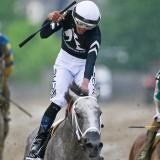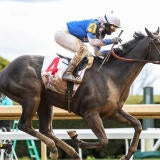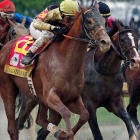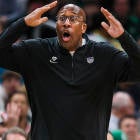Country House came into the 2019 Kentucky Derby as a long shot and did not cross the finish line at Churchill Downs ahead of Maximum Security, who seemingly went wire to wire for a thrilling victory on a muddy track in Louisville. But it was Country House who was declared this year's Kentucky Derby winner after a disqualification not long after the race concluded.
How, exactly, did this switch occur? And why did someone object to Maximum Security's victory in the first place?
As NBC Sports explained during the broadcast, riders are permitted to submit objections following the race if they believe they or other horses have been interfered with on the track. These objections are reviewed by a team of three Kentucky Derby stewards, who are essentially the officials overseeing the race, and if those stewards believe interference did occur and was severe enough, they can justify disqualification of a horse.
Country House trainer Bill Mott raised an objection regarding impediments to his horse following the race but told NBC Sports as he awaited a ruling that he believed several horses and jockeys had been clipped during the run.
"If it was a maiden claimer on a weekday, the winner would come down, and it's not supposed to matter — Kentucky Derby or whatever it is," Mott told NBC. "There's a couple of riders that nearly clipped heels and went down in there."
Ultimately, the stewards decided that Maximum Security's movement on Saturday's sloppy track was, in fact, an impediment.
An explanation of Maximum Security's #KyDerby disqualification. pic.twitter.com/vf8AN4qvD2
— Kentucky Derby (@KentuckyDerby) May 4, 2019
The only reason this probably sounds unfamiliar is because the on-track disqualification of a an apparent winner had never occurred in the 144-year history of the Kentucky Derby leading up to Saturday's decision. Dancer's Image had won the 1968 Kentucky Derby but was disqualified later after failing a post-race drug test.
Paulick Report breaks down in more detail the process of the stewards' review of objections:
In Kentucky, the officiating process can be viewed as two-step ... stewards in the state are not required to take a horse down if it's determined that he fouled a rival. Therefore, stewards must first decide whether a foul took place, and then decide whether the foul was severe enough that it should merit a change in the order of finish.
So what would it take for a horse to be taken down in the Derby? There's no blanket answer, but in a 20-horse field, any significant interference would likely come toward the end of the race ... Interference would also have to be pretty clear; (steward Barbara) Borden said the prevailing philosophy for the current group of stewards is to let a race result stand if they have reasonable doubts about whether a move cost a horse the race.





















